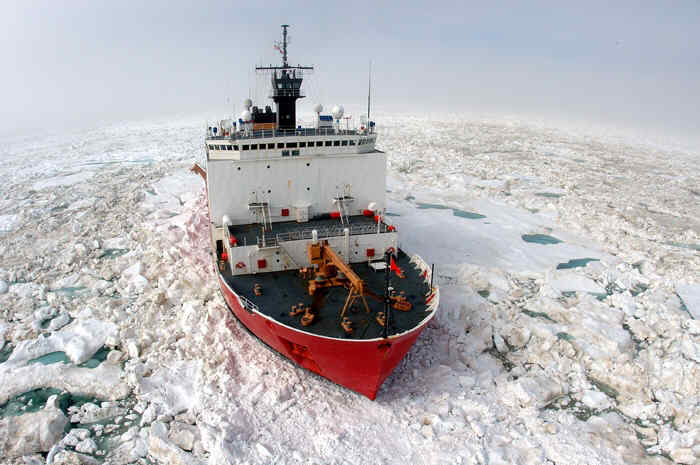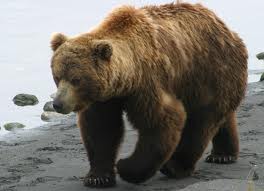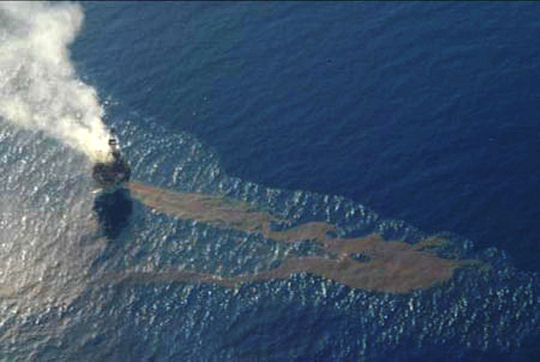|
|
|
|
|
|
|
|
5th European Conference on Permafrost, June 23-July 1, 2018 (Chamonix-Mont Blanc, France). In the continuation of the International and Regional conferences convened by the International Permafrost Association, the 5th European Conference on Permafrost (EUCOP 2018) will be held in Chamonix-Mont Blanc, France, 23rd June - 1st July 2018. The conference aims at covering all relevant aspects of permafrost research, engineering and outreach on a global and regional level. Conference website: here.
Arctic Observing Summit 2018, June 24-26, 2018 (Davos, Switzerland).The Arctic Observing Summit (AOS) is a high-level biennial summit that provides a platform to address urgent and broadly recognized needs of Arctic observing across all components of the Arctic system. AOS 2018 will be held in Davos, Switzerland ( June 24-26) and will focus on pressing issues in the implementation and support of sustained observations that can be addressed through a business-case lens. To that end, short submissions are requested that address any and all aspects of the overarching theme and sub-themes. Additional information can be found here.
|
Media
Ocean Science Agency Chief Floats Removing 'Climate' From Mission Statement, New Focus on Trade Deficit. A recent presentation by the acting head of the United States' top weather and oceans agency suggested removing the study of "climate" from its official mission statement, focusing the agency's work instead on economic goals and "homeland and national security." Critics say this would upend the mission of the $5.9 billion National Oceanic and Atmospheric Administration. But the administration disputes that interpretation, saying the presentation did not intend to create a change of direction at a vast agency that tracks hurricanes and atmospheric carbon dioxide, operates weather satellites, manages marine reserves and protects endangered ocean species, among other functions. The Washington Post
 Coast Guard Cutter Healy Moors in San Diego Before Upcoming Arctic Trek. Coast Guard Cutter Healy Moors in San Diego Before Upcoming Arctic Trek. After completing a six-month maintenance period following a five-month Arctic deployment in 2017, the cutter stopped in San Diego Saturday and opened for public tours Sunday. Coast Guard crewmembers answered visitor questions about Healy and offered details about the planned operations during the upcoming Arctic trek. According to the Coast Guard, "Healy will provide presence and access in the Arctic to conduct three major research missions. In partnership with National Oceanic and Atmospheric Administration and the Office of Naval Research, [the crew will] conduct physical and biological research in the Arctic Ocean." Times of San Diego
Major Canadian Space Project to Monitor Arctic Sea Ice Moves a Step Closer. The most important and expensive Canadian space project in a decade is about to leave the building. Engineers at a facility near Montreal are making their final checks of three identical satellites that together make up the Radarsat Constellation Mission. Built by MDA (now the U.S.-based Maxar Technologies), each spacecraft carries a sophisticated radar imager that can see details on Earth's surface down to one metre. They are scheduled to be shipped separately to California next month where they will be reunited in advance of a scheduled November launch aboard a Space X Falcon 9 rocket. The Globe and Mail
 How Does the Summer Solstice Affect Animals. How Does the Summer Solstice Affect Animals. The summer solstice, which marks the longest day of the year in the Northern Hemisphere, happens today (June 21) at 6:07 a.m. EDT (1007 GMT). This event happens when Earth's tilt toward the sun is at its maximum and the sun points directly over the Tropic of Cancer. That extended daylight makes it difficult for people in northern latitudes to know when to go to sleep if they aren't looking at a clock, but the midnight sun is no problem for many other animals. Live Science
|
|
Future Events
 Coastal Response Research Center Requests Input on the State of Science on Dispersant Use in the Arctic. The Coastal Response Research Center (CRRC) recently collected statements and reports on five topic areas related to dispersant use in the Arctic: efficacy and effectiveness; physical transport and chemical behavior; degradation and fate; eco-toxicity and sublethal impacts; and, public health and food safety. CRRC request written input on the statements the scientists made on the state-of-the-science regarding dispersant use, particularly as it applies to Arctic waters. Written comments are requested by July 13th. More information on this initiative is available here. Coastal Response Research Center Requests Input on the State of Science on Dispersant Use in the Arctic. The Coastal Response Research Center (CRRC) recently collected statements and reports on five topic areas related to dispersant use in the Arctic: efficacy and effectiveness; physical transport and chemical behavior; degradation and fate; eco-toxicity and sublethal impacts; and, public health and food safety. CRRC request written input on the statements the scientists made on the state-of-the-science regarding dispersant use, particularly as it applies to Arctic waters. Written comments are requested by July 13th. More information on this initiative is available here.
17th International Congress of Circumpolar Health (ICCH17), August 12-15, 2018 (Copenhagen, Denmark). The ICCH congresses are held every third year in different locations in the circumpolar area and represent the largest scientific meetings worldwide on circumpolar health. The ICCH congresses serve as the primary source of information exchange and scholarly communication in issues relating to circumpolar health. More than 750 participants generally register and participate in each Congress, and more than 400 scientific papers or posters are usually presented.
UArctic Congress 2018, September 3-7, 2018 (Oulu and Helsinki, Finland). The UArctic Congress 2018 will bring together key UArctic meetings and a science conference into one single gathering, including business meetings of the Council of UArctic, Rectors' Forum, Student Forum, and Thematic Networks & UArctic Institutes Leadership Team. The Congress is an integral part of the Finland's Arctic Council chairmanship program, and open to the public. The event will highlight the themes and priorities of the Finnish chairmanship, including the goals of the United Nations' 2030 Agenda for Sustainable Development, and the Paris Agreement under the UN Framework Convention on Climate Change.
Scientific Exploration of the Arctic and North Pacific (SEA-NorP), September 25-27, 2018 (Mt. Hood, Oregon USA). This workshop will include discussion of hypotheses that can be tested by scientific drilling in the region, the technology necessary to achieve those goals, ideal sites for drilling based on existing data, and where additional site survey data is needed. The goal of the workshop organizers is that multiple proposals will be initiated at the workshop, both for full cruise legs and for shorter, targeted expeditions around the following themes: ocean gateways, geohazards, volatile cycling, ice histories at transition zones, biosphere and climate.
The second Arctic Biodiversity Congress is hosted by the Conservation of Arctic Flora and Fauna (CAFF), the biodiversity working group of the Arctic Council, and the Ministry of the Environment, Finland. The second Arctic Biodiversity Congress will build on the success of the first Congress, held in 2014 in Trondheim, Norway, and will bring together scientists, policymakers government officials, Indigenous representatives, Traditional Knowledge holders, industry, non-governmental organizations, and others to promote the conservation and sustainable use of Arctic biodiversity.
|
|

  
4350 N. Fairfax Drive, Suite 510
Arlington, VA 22203, USA
External links in this publication, and on the USARC's World Wide Web site ( www.arctic.gov) do not constitute endorsement by the US Arctic Research Commission of external Web sites or the information, products or services contained therein. For other than authorized activities, the USARC does not exercise any editorial control over the information you may find at these locations. These links are provided consistent with the stated purpose of this newsletter and the USARC Web site.
|
|
|
|
|
|
|
|
|
 Coast Guard Cutter Healy Moors in San Diego Before Upcoming Arctic Trek. After completing a six-month maintenance period following a five-month Arctic deployment in 2017, the cutter stopped in San Diego Saturday and opened for public tours Sunday. Coast Guard crewmembers answered visitor questions about Healy and offered details about the planned operations during the upcoming Arctic trek. According to the Coast Guard, "Healy will provide presence and access in the Arctic to conduct three major research missions. In partnership with National Oceanic and Atmospheric Administration and the Office of Naval Research, [the crew will] conduct physical and biological research in the Arctic Ocean." Times of San Diego
Coast Guard Cutter Healy Moors in San Diego Before Upcoming Arctic Trek. After completing a six-month maintenance period following a five-month Arctic deployment in 2017, the cutter stopped in San Diego Saturday and opened for public tours Sunday. Coast Guard crewmembers answered visitor questions about Healy and offered details about the planned operations during the upcoming Arctic trek. According to the Coast Guard, "Healy will provide presence and access in the Arctic to conduct three major research missions. In partnership with National Oceanic and Atmospheric Administration and the Office of Naval Research, [the crew will] conduct physical and biological research in the Arctic Ocean." Times of San Diego How Does the Summer Solstice Affect Animals. The summer solstice, which marks the longest day of the year in the Northern Hemisphere, happens today (June 21) at 6:07 a.m. EDT (1007 GMT). This event happens when Earth's tilt toward the sun is at its maximum and the sun points directly over the Tropic of Cancer. That extended daylight makes it difficult for people in northern latitudes to know when to go to sleep if they aren't looking at a clock, but the midnight sun is no problem for many other animals. Live Science
How Does the Summer Solstice Affect Animals. The summer solstice, which marks the longest day of the year in the Northern Hemisphere, happens today (June 21) at 6:07 a.m. EDT (1007 GMT). This event happens when Earth's tilt toward the sun is at its maximum and the sun points directly over the Tropic of Cancer. That extended daylight makes it difficult for people in northern latitudes to know when to go to sleep if they aren't looking at a clock, but the midnight sun is no problem for many other animals. Live Science

